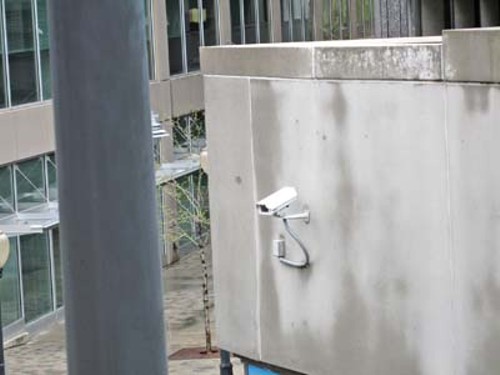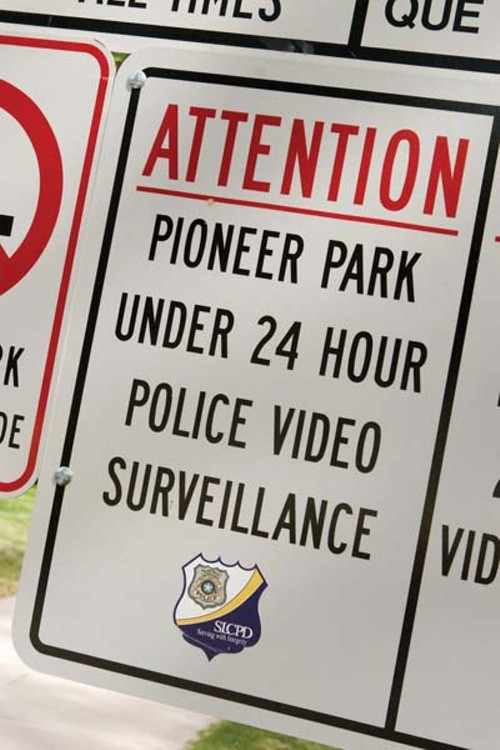They're Watching You
What no one is telling you about the proposed cop shop in Library Square.
By Ted McDonoughWander away from the park with your head tilted up, and you’ll start noticing the half-globe surveillance cameras everywhere: all over Gallivan Plaza, watching the sidewalk outside the now-abandoned Port O’Call, even hanging from a sidewalk streetlight at the intersection of 200 South and West Temple.
Feeling paranoid yet? What if all those security cameras—public and private— were hooked into a central police monitoring station? It’s already happening in cities from Chicago to Dallas, though not yet here, according to the Salt Lake City Police Department.
A few years down the road, however, Utahns might look back on February 2009, when the Pioneer Park cameras began monitoring activities in the square 24/7, as the birth of the city’s new surveillance society in which unblinking lenses watch indoors and out while state supercomputers troll though citizens´ personal electronic information searching for “suspicious activity.”
Already, police cameras peek in at some Salt Lake City businesses. Now, a Utah state program of interlinked state and federal supercomputers mingling data on petty thieves and known terrorists with the personal identity and credit information of lawabiding citizens is set to explode.
|
|
When Salt Lake City watchdog Steve Erickson saw millions of dollars of high-tech spying equipment included on Salt Lake City’s list of “shovel-ready” stimulus projects, it confirmed what he´d been hearing about federal surveillance efforts coming to Utah: facial-recognition technology for Utah Transit Authority buses, an aerial surveillance drone to monitor crowds, hundreds of thousands for wireless surveillance and an artificial-intelligence computer capable of “watching” surveillance cameras for suspicious activity.
“How is spying on Americans creating jobs?” asks Erickson, who, with a small Salt Lake City organization called Citizens Education Project, has been in the forefront trying to keep government surveillance at bay in the Beehive State.
Tall and wiry with a deep-voice, Erickson’s viewpoint on government spying stems from his involvement in student movements during the Vietnam War. Back then, activists were outraged to learn that FBI COINTELPRO agents infiltrated student groups. Forty years on, Erickson sometimes wonders if he’s the only one who cares anymore. He has watched the Utah Fusion Center slowly develop for years but has had little luck trying to pique the interest of public officials.
“If people are comfortable with passive-invasive technology, so be it,” says Erickson. “But some of us old-school boys remember the government dossiers on us during the Vietnam protests.”
One item, in particular, on Salt Lake City’s stimulus wish list caught Erickson’s eye: An $836,000 “shovel ready” project asking for a “software program to search, manage and analyze vast amounts of criminal investigation information from wide ranging data sources” and two police officers to run it. A similar request was described in an April 2009 city grant application as “a technology solution to mining for information collected by state and federal agencies."
It turns out that money is intended for the Utah Fusion Center, a partnership between Utah’s Department of Public Safety, the FBI, the federal Homeland Security Department, the National Guard and local police agencies to create a network of interlinked computer databases and a core of specially trained officers to feed information to the system.
Administered by the state Department of Public Safety, the Utah Fusion Center is part of a network of 60 to 70 fusion centers established throughout the country with $250 million of grants from the terrorism-fighting federal Homeland Security Department. The centers caught flak April 1 during a day of hearings devoted to the program by a congressional Homeland Security committee. Critics warned of America returning to the 1960s where local police “red squads” spied on activists and politicians in the name of rooting out subversives.
The American Civil Liberties Union pointed to political spying already begun by state fusion centers, such as a Texas fusion center asking police to report activities of anti-war protesters and a “threat assessment” from Virginia’s fusion center that called the state’s historically black universities “a radicalization node for almost every type of extremist group.”
In the Beehive State, the Utah Fusion Center—also known as the Statewide Information Analysis Center—has watchdogs and lawmakers shaking their heads for another reason; they have already fought—and defeated—the snooping supercomputers once before.
In 2004, the all-seeing national computer database that promised to find terrorists by combing Americans’ electronic files was called MATRIX, or Multistate Anti- Terrorism Information Exchange. The project was so badly bungled—and so widely pilloried by groups as disparate as the ACLU and the Utah Eagle Forum—that former Utah Gov. Olene Walker made scrapping it one of her first acts after taking office.
Matrix Reloaded
Championed
by former Utah Gov. Mike Leavitt and Florida Gov. Jeb Bush, both
Republicans, MATRIX emerged from the wreckage of Total Information
Awareness, a domestic-spying program proposed in the aftermath of 9/11,
but quickly closed down by Congress in 2003 citing post-Watergate laws
that ban the government from collecting dossiers on lawabiding
Americans.
MATRIX tried to get around the problem by turning
the job of collecting state databases over to a private Florida
company—a private company that just happened to be financed by the
federal Homeland Security Department with grant money obtained by a
former commissioner of the Utah Department of Public Safety.
Public
records obtained in 2004 by Citizens Education Project showed that
Leavitt had signed Utah up for MATRIX and downloaded Utah databases
into the system without telling the Legislature. Utah’s exit was the
beginning of the end for MATRIX, and a panel Walker assembled to review
the program recommended Utah stay away until it worked out “adequate
oversight and appropriate privacy safeguards.”
Fast-forward
five years and it seems the MATRIX, like the 2003 movie sequel, has
been reloaded. A recent public records request by Citizens Education
Project shows that the Utah Fusion Center, in addition to accessing
law-enforcement records, is—like MATRIX—tapping into databases
maintained by private companies that claim to have billions of records
on law-abiding citizens.
Some Utah legislators who served on
former-Gov. Olene Walker’s 2004 MATRIX review committee are
flabbergasted the state is again moving to share its citizens’
information and, yet again, they have heard hardly a peep from the
governor’s office.
State Sen. Gene Davis, D-Salt Lake City,
says the explicit direction from the 2004 committee was to require
future governors to return to the Legislature before moving forward
with the MATRIX or any similar program. Davis isn’t against
law-enforcement agencies sharing information but says, “You have a
certain level of right to privacy. A state database on how many times
you burped when you were a baby, that’s a little alarming to me.”
“With
the way technology is, there is no way to say data can’t be fused,”
says Rep. John Dougall, R-American Fork, another member of the 2004
MATRIX review panel. “But we need to make sure we have the appropriate
constraints on government such that it doesn’t become a reckless
endeavor.”
Speaking of...
-
Monumental Order
Challenging the Antiquities Act of 1906, Trump promises 'tremendously positive things'
- Apr 26, 2017
-
Monday Meal: Pie & Beer Pairings
- Jul 25, 2016
-
Wine (and Gin!) Wednesday: Beehive @ Bandits
- Jun 22, 2016
- More »
More by Ted McDonough
-
Stimulated
If you don´t like the federal stimulus yet, wait a few months.
- Jul 15, 2009
-
Chaffetz's Constitution, Health Care Reform, Utah's Economy & Claire Geddes' Return
Congressman Jason Chaffetz, R-Utah, is cosponsoring legislation that would deny citizenship to children born in the United States to noncitizen parents, reversing long-standing law that everyone born in America is a citizen.
- Jul 15, 2009
-
Skinny Utahns, Camp Williams' Data Center & BCS Busters
Utahns are the eighth skinniest people in the country, according to new statistics from the Robert Wood Johnson Foundation.
- Jul 8, 2009
- More »
Latest in Cover Story
Readers also liked…
-
Forget the family pedigree—Robert F. Kennedy Jr should not be the next president of the United States
Trojan Horse
- Jun 21, 2023
-
Women decry harassment and toxic culture at St. George auto dealership
Men at Work
- Oct 11, 2023







